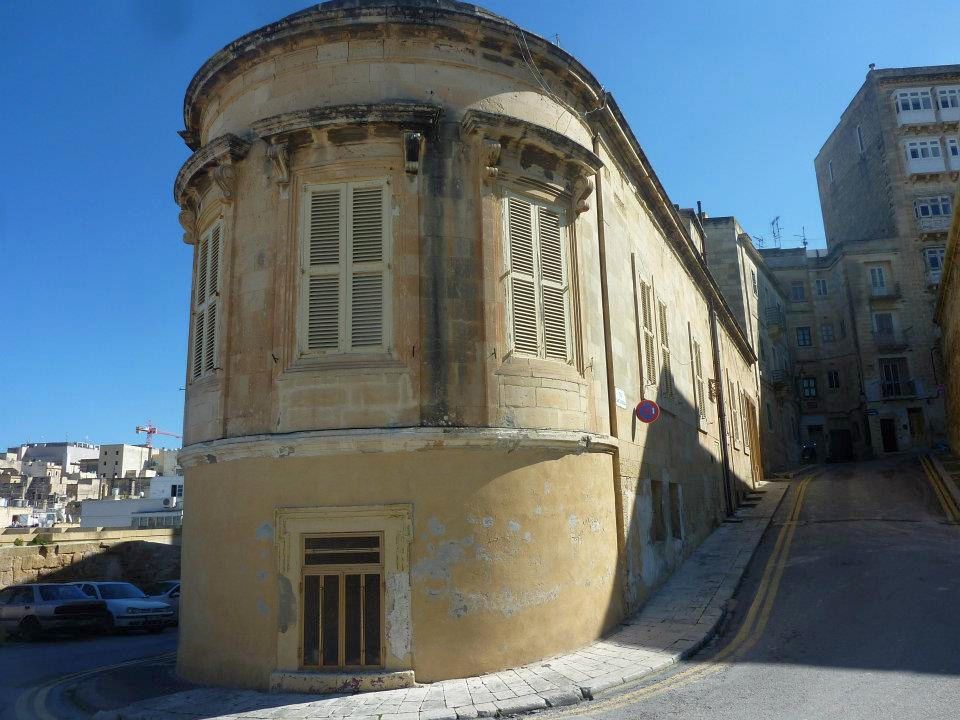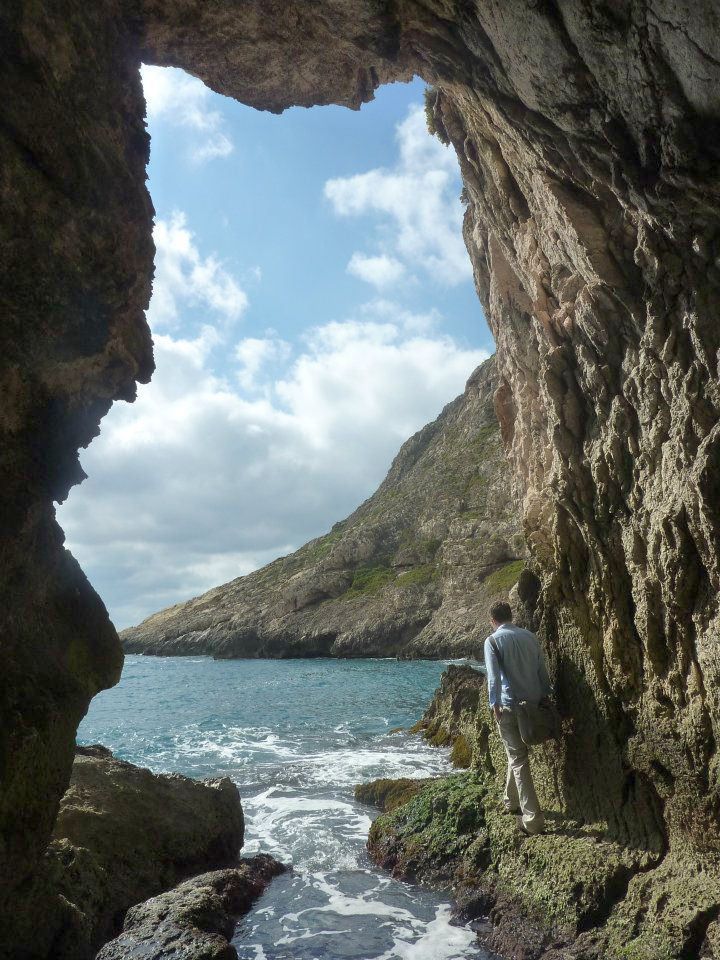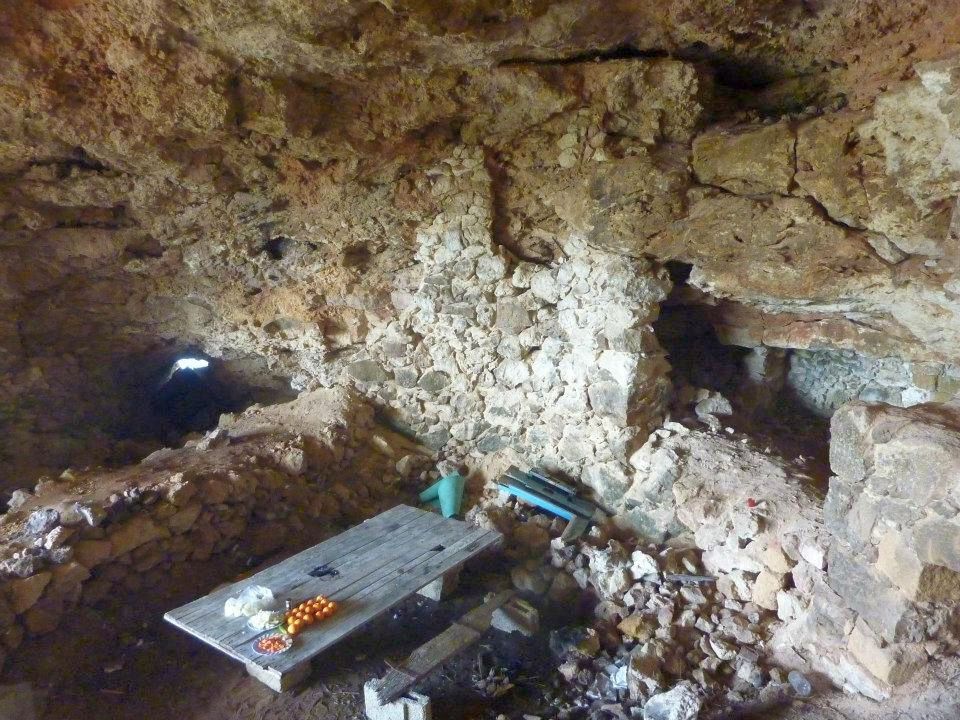February in Gozo

In my mind, I will always envision Malta as paradise. I realize much of this is down to timing — conditions that couldn’t be replicated. Leaving a dreary Scottish February at 1 a.m. and waking up among palm trees; exploring a new place without hoards of other tourists; a first one-on-one trip with a first love. But I still can’t help but suspect that the constants in Malta make it a paradise regardless: amazing food, beautiful architecture and near unavoidable access to the Mediterranean Sea.
We exit the plane in Valetta to a world brimming with contrasts from the one we had left behind. I breathe in the warm, moist air and it instantly relaxes me — I’m used to the sharp sting of inhaling icy wind back home. Palm trees are casually dotted across the parking lot and I’m compelled to run across the street to touch one. Putting both hands on its rough bark, I’m giddy to find this tropical symbol is so tangible. I follow the tree trunk up with my eyes until I’m gazing through fronds of green leaves at the perfect blue sky above them and am forced to close my eyes against the sun. So this is Malta.
On the bus to the city center my attention is divided between the new sights we’re passing and the ones inside the vehicle itself. The vibrant green landscape with its low hills surrounding us makes me realize for the first time how different a green fed on rain, like in Scotland, is from one born of sun. The way the sunlight brightens everything is touches seems impossible, while occasional large patches of land are plunged into shadow by a cloud floating slowly by, chopping up the landscape into a patchwork of bright and dark green.
However, this is also my first trip to a country where I have absolutely no history with, or intuitive knowledge of, the language, and my eyes keep resting on the entirely unfamiliar words that appear on a flashing board at the front of the bus, identifying every stop. The intricate words appear Arabic and remind me of the embarrassing fact that I had no real idea where in the world Malta was until I was in the midst of booking tickets here.
I had a vague idea that Malta might be Spanish, and I knew it was an island, but even after my bags were packed, it was only at the airport waiting in line that I first saw where Malta is on a map. Among the pastel pink and blue sweatsuits of early morning British travelers at Edinburgh Airport, I had looked at the map of flight routes for our airline. There was Malta, a small circle in the middle of the Mediterranean Sea, beneath Sicily and just above Tunisia. Post-exams, facing many more months of dank, chilly mornings and 3 p.m. sunsets, Charlie and I had been huddled in bed in woolen sweater and turned to Ryan Air on a whim to look at what was available. £30 tickets to somewhere warm? Precise geography hadn’t seemed to matter.
Valetta is only a brief stop on our journey further north, to small island of Gozo north of the mainland, but we’re excited to let the capital city serve as an introduction to Malta. Walking down narrow streets at random, we stop into an unassuming restaurant for lunch. Simple wooden chairs surrounding tables with plastic red-and-white checkered covers and the fan crookedly mounted on the wall makes the place look almost like someone’s living room. Everything on the menu is exactly the kind of food we’ve been craving and we order mussels in a spicy tomato sauce and a tasting plate of local salamis and cheeses. They arrive sprinkled with fresh herbs and we jump enthusiastically from dish to dish, unable to decide what we like best.
With all the local shops and churches closed for siesta, Charlie and I wander empty streets enjoying the warmth and the architecture. While in Scotland everything is dreary and grey; here we are surrounded by light. The buildings are the color of sand, accented with greens, set against a blue sky. A man sitting in a horse-drawn carriage is eager to gain our business and slowly follows us down one of the wider roads, asking us questions. Off-season in a city known for nightlife — a young couple holding hands mid-afternoon must seem like a perfect opportunity — but we decline and instead sit sleepily in the sunshine, draped over our luggage until it’s time for our next bus ride.
With an hour’s trip ahead of us, we let the sun and the food and the early morning catch up and enjoy a brief siesta of our own before our ferry ride to Gozo. While only a few miles away from the mainland of Malta by sea, the 30,000 people of Gozo maintain their own culture, including distinctive dialects and traditions, and we had chosen to stay there because of the quieter, more rural atmosphere. The ferry takes only half an hour, and we head straight for one of the empty tables on the boat’s deck to enjoy the views and the wind while the other passengers stay seated inside.
As the land ahead starts to define itself, I can feel my excitement growing; there is something instantly enchanting about a place only accessible by water, as if existing apart from the rest of the world has kept it protected. The sun sets as we approach the port, darkening the calm sea until it’s almost black. Lights on the land ahead appear in glowing orbs, like candles spread along the shore, with the church at the top of the hill the brightest of all.
The closer the boat gets, the more this illusion dissolves, and by the time we disembark, we have no desire to linger here and instead board another bus to Victoria. The largest city in Gozo, we stop here for a snack and a stroll in a park — one with more broken glass than trees, but somehow charming nonetheless -– before getting onto another bus which takes us the short drive away to our town. The hotel is right on the sea and we walk along the water in the dark to a tented restaurant where we end our first day in Gozo feasting on octopus.
The next morning begins, as any day in paradise should, overlooking the Mediterranean Sea as we enjoy our breakfast. A handful of older British men — the expats — are sitting leisurely outside and they nod in greeting as we board the same small bus that had brought us to our hotel the night before. We arrive in Victoria in the daylight for the first time ready to explore and find ourselves in another city of sand-colored buildings sitting along curving, narrow streets.
Victoria, also known as Rabat, is the historical center of this island, which stayed small over the centuries due to near constant raiding and external domination. From Arab rule to Norman conquest and frequent changes in ownership as European powers gifted the islands around Sicily to various noblemen; from the long-term occupations of the French under Napoleon and then the British starting in 1800, Malta has inherited a unique blend of cultures, only gaining independence finally in 1964.
We climb to the top of the citadel, high enough that the wind here is fierce, and adds drama to the stunning landscape we overlook. With Malta’s distinctive low limestone hills visible in every direction, we have a panoramic view of wide, empty country to our left, while the rest of city is laid out below us to our right. As much as I want to gaze whimsically over it all, I keep fidgeting in a constant effort to keep my hair out of my eyes and the summery dress I am wearing from blowing up around my waist. Sheltered back inside the citadel we tour the prison, walking in and out of cold stone cells, and visit the folklore museum. On our walk back down the hill, we stop inside the beautiful San Gorges Basilica, catching a few serene minutes of the hourly mass.

Back in our little town on the sea, we find one of the many caves this island shelters at the foot of a small hill near our hotel. Walking down steps carved into the rock, we find ourselves in a water-filled cavern that used to serve as a secluded bathing area for nuns. Waves roll gently towards us and then slowly drift away, filling the cave with a peaceful rumble.
On the walk back, I find myself first stepping lightly in the wet sand, then strolling ankle-deep before wading up to my knees. The Mediterranean is impossible to resist, no matter the time of year. Charlie stays by the shore, but I keep walking steadily forward, hypnotized by the smooth, clear water. I can feel eyes following me as patrons of nearby restaurants are amused by the prospect of anyone swimming in the cold winter water.
We walk further down the coast to find a slightly less populated entry point to the sea where I strip down to a bathing suit. An older British man walking by pauses — “You’re really going to swim?” — and continues on with a smile. I guess it isn’t the ideal time of year, but I’ve spent the past three winters living by the North Sea. I shrug and smile back and begin slowly climbing the rickety metal ladder into the cold water. The bottom rungs are slippery with algae. I let myself drop and struggle to catch my breath after the shock of the cold, but in seconds I’m happily floating on my back looking up at the bright afternoon sky, kicking away from the moss-covered rocks that line the shore.
With no time to change before our scheduled wine tasting and vineyard tour, I throw my dress on over my suit, wipe the mascara off my cheeks and Charlie and I quickly eat some crepes while waiting for a bus heading back inland. When we arrive at the family-run operation, our passionate tour guide shows us and two other couples through their extremely informal but impressive winery, explaining the fermentation and aging processes of their four wines.
One of the couples is from Malta, but we’re all new to the practice of winemaking on the island. After touring the winery, we walk through the vineyard and hear more about the challenges of growing grapes on an island. Between the hot and humid weather, the limestone soil and the salty air and land, only certain grapes are suited for this atmosphere. The salt influences the flavor of the wine as well, and while Malta is not synonymous with wine production like some other Mediterranean countries, the distinctive flavor of what they do produce is held in high esteem internationally.
Now at the top of the hill, we sample the wine. The sun has lost its intensity and begins to set and I shiver from my still wet hair hanging down my back. I pull Charlie’s grey hoodie over my thin dress to stay warm as we stand chatting and sipping next to a small table placed atop this vineyard. I get lost in thought imagining the prehistory of this island our guide spoke of, picturing the sea dropping away to reveal a bridge of dry land leading from Europe to Africa directly through Malta. A time before sea levels rose and cut off this access, leaving Malta stranded in the middle.
The same British expats greet us the next morning as we wait for our bus. One of them recognizes me. “Hey, you’re that girl who went swimming!” It’s true that I never saw anyone else in the water on our stay, and news spread quickly. We tell them that this is our designated beach day and we have taken their advice and settled on Ramla Bay.

The wide, empty sand beach is perfect for playfully running around and splashing in the waves and we spend our morning enjoying the feeling of sand in our toes and the fresh air on our faces. Spotting a cave at the top of nearby hill, we decide to search for it and quickly find a small footpath leading upwards from the beach. As we climb, we are surrounded first by cactus plants and then by trees and as we get close to the cave. We realize we’ve entered a farm of some sort, with clear rows of crops growing all around us and an expansive grove of orange trees nearby.
Out of this silent sanctuary, a short, tanned Maltese farmer appears, walking towards us in a white undershirt with a huge, semi-toothless grin on his weathered face. Instead of scolding us for trespassing, he waves us on enthusiastically, pausing every few steps to tell us about the crops we pass by. He chats away in an indiscernible mix of a local dialect and English, leaning down to touch the leaves of various plants as he talks and looking up at us with a knowing nod, happy to share his knowledge even if we aren’t exactly able to receive it. His little dog trails behind him, equally eager and friendly.
Just outside the cave we come across the farmer’s wife, a hard looking woman who seems significantly less pleased by our presence. She carries a wooden basket full of oranges, and we follow the two of them into the cool, spacious cave where a half dozen other workers are sitting on long wooden benches eating at a table covered in oranges with a small fireplace built into the wall behind them.
I turn to look back the way we came and the wide opening in the hill perfectly frames a view of the sea and beach below in a way that makes the whole world slow down for a minute. The farmer points towards the back of the space and we climb up the narrow steps we see there until we are standing atop the cave. Barking dogs follow us and we all stand atop the world together, surveying the long view of the empty land below us.
As we say our goodbyes, our new friend presses freshly picked oranges into our hands with a huge smile. They return to work and we walk back down the hill, carefully grasping onto our oranges as precious proof that this place really existed. Standing by the side of the road waiting for our bus, I lean against a wooden fence and hold one of those perfect oranges up to my nose to breath in what I can only imagine is the smell of sunshine. When we finally taste them, they are unlike any other oranges I’ve had before – no tang at all, only sweet.
Later that evening, we leave the hotel by the entrance facing the sea and turn right and walk along the shore to the nearby hill. This time we don’t descend into the cave or walk alongside it to a restaurant, but walk up to the very top. Sitting on the grass overlooking the sea in complete silence and solitude, we gaze at Gozo lit by the sun one last time and watch until it is absorbed into darkness minutes later.

 Lucy DiSanto lives in New York City where she accidentally stumbled into a job she loves with an experiential tech agency. Over the past few years she has worked and lived in Scotland, Italy, London and India, and remains eager for any opportunities to continue her global adventures, but enjoys writing about them in the meantime. You can find more of her work at Roseberry-Rambles.blogspot.com.
Lucy DiSanto lives in New York City where she accidentally stumbled into a job she loves with an experiential tech agency. Over the past few years she has worked and lived in Scotland, Italy, London and India, and remains eager for any opportunities to continue her global adventures, but enjoys writing about them in the meantime. You can find more of her work at Roseberry-Rambles.blogspot.com.
